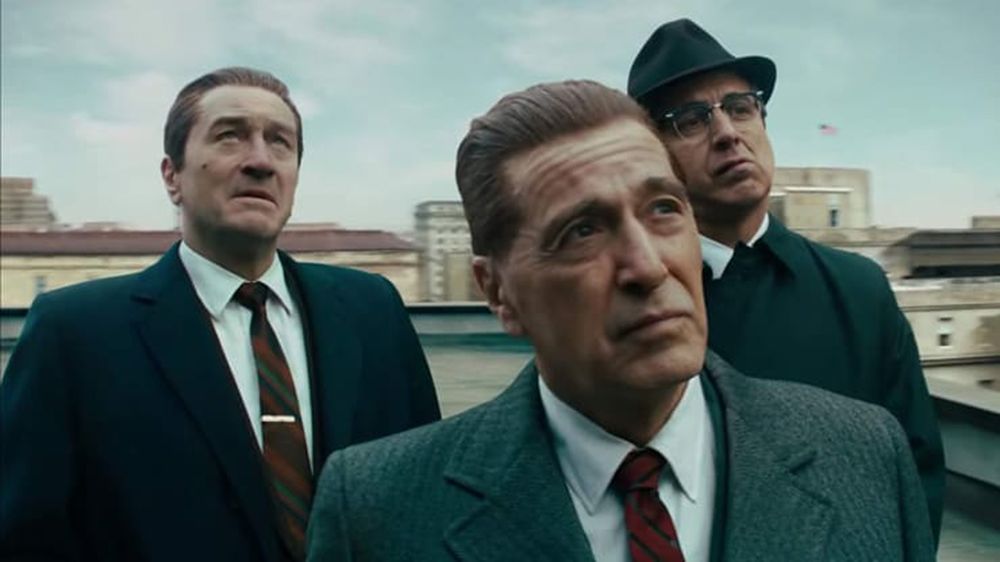Directed by Martin Scorcese | Written by Steven Zallian adapting a book by Charles Brandt | 209 min | Netflix
Martin Scorcese is probably the planet’s most well-known, well-regarded master filmmaker, documentarian, and producer. In almost 50 years of great movies— including Taxi Driver, Raging Bull, and After Hours— he’s plumbed themes related to Catholic guilt and masculine obsessions. Many of his films feature tortured, violent men wrestling with issues of loyalty and regret. This current effort available in Netflix is impressively written and constructed, with the expected professionalism Scorcese brings to all his work, but there isn’t much here that feels new.
The sense of repetition seems even more ironic now that Mr Scorcese has written his New York Times op-ed about the “blight” of the Marvel Cinematic Universe, remarking that “they are designed as variations on a finite number of themes” — I say that as someone who enjoys superhero movies and a number of the films in Scorcese’s body of work.
I won’t deny, it’s an unadulterated thrill to see Robert DeNiro back working with the filmmaker who helped bring him to prominence in the 1970s—there’s a smaller role here for another Scrocese veteran, Harvey Keitel, too—and in material like this, an American organized-crime drama, everything feels comfortably familiar. But to what end? As one of the characters in this film might remark, when you release a three-and-a-half hour feature film, “you’re sayin’ something.” Scorcese didn’t want to make this into a series, but then he couldn’t get his gifted editor, Thelma Schoonmaker, to cut the picture any tighter? Sure, the narrative is paced reasonably well, but that still doesn’t justify the film’s gargantuan running time.
It’s the story of an Irish American working man, Frank Sheeran (DeNiro), who was a liaison, peacemaker, and enforcer for both the Italian Mob and the Teamsters Union, working with Russell Buffalino (Joe Pesci) and famed Union leader Jimmy Hoffa (Al Pacino). The film ends up looking at Sheeran’s loyalty to his various commanders, and how he paid for it in the long term.
Sheeran was in the war where he got comfortable with killing, and in case we didn’t get the gist we’re constantly reminded he’s at his best in the role of a soldier, taking orders. His taciturn, respectful manner earns him respect from his Italian-American bosses and Hoffa both, and he advances in his business, eventually becoming the head of his own Teamsters branch. Scorcese doesn’t whitewash the corruption at the heart of this brotherhood—in this world everyone’s culpable, everyone’s on the take.
This is one of DeNiro’s most mannered performances in years—it’s almost like he’s doing a Robert DeNiro impression, with his patented grimace painted on his face. Much has been made of the de-aging technology that turned actors in their 70s into men in their 40s and 50s. It’s just not very convincing. We all know what DeNiro and Pacino looked like 30 years ago, and how they moved. Even under the digital veil, they still waddle like older men.
Also, who thought it was a good idea for DeNiro to wear blue contacts to play an Irish American character? It’s distractingly artificial. And then the choice to have Pacino play the Germanic Hoffa, throwing around racial slurs against the Italians? Maybe it’s because we know these iconic Italian-American performers so well, but playing real people they seem like an odd fit. For the record, Danny DeVito’s largely forgotten Hoffa, starring Jack Nicholson, felt like it got closer to what the Teamsters boss was actually like.
Then there’s the backstory, that Sheeran had a family but he neglected his kids, doing little to shelter them from his life of violence. I kept hoping the final act would give Anna Paquin, who plays his adult daughter, Peggy, something to do—but this isn’t a film about Sheeran’s relationship with his daughter, it’s about his relationship with regret and with an uncaring authority. Scorcese’s made movies like Alice Doesn’t Live Here Anymore with women in the forefront, and his crime drama Casino gives Sharon Stone a terrific role, but there’s also plenty of examples in his movies of this: women are plot functionaries, silent reactors to the men’s stories.
Zallian’s script offers a lot of pleasures, including great stretches of casual banter, where nothing is said explicitly but the message always gets across: “It’s what it is” is now an expression with a whole lot more specificity thanks to The Irishman. The MVP in this cast is Pesci, who gets a meaty part against type following years of absence from the screen and reminds us how good he is.
But while this might be Scorcese’s final, grand statement on the crime drama he knows so well, with a message that a devotion to duty in that life just leads to loneliness and suffering for your family, it doesn’t feel like something we haven’t seen before in his better movies.













